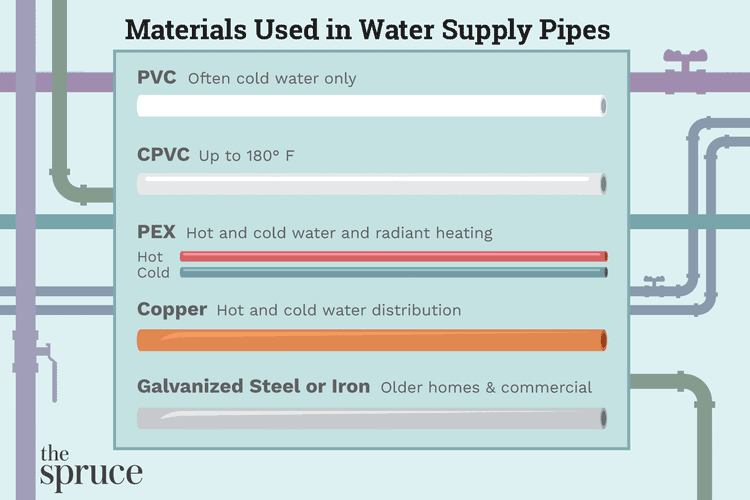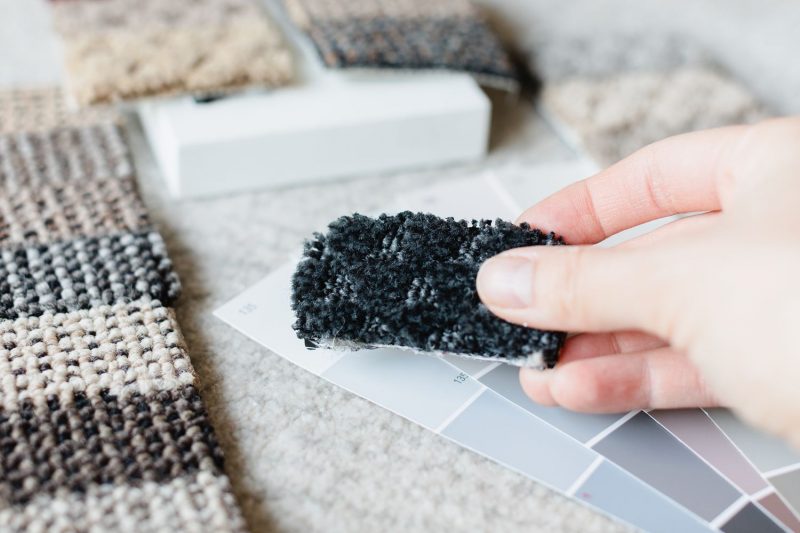Carpet and hardwood are among the most popular flooring options, yet they are quite distinct from each other. Carpet is a soft, synthetic, and affordable material that provides a quiet atmosphere but typically has a shorter lifespan. In contrast, hardwood is a natural, durable, and pricier flooring choice that can endure for many years, often outlasting the time you spend in your home. By recognizing the differences between carpet and hardwood, you can make a well-informed decision about where to use each type in your living space.
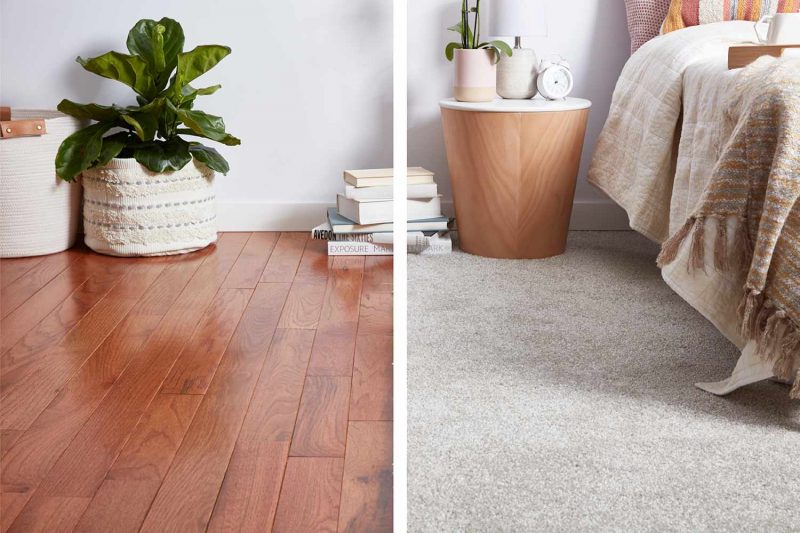
Contents
Rug Flooring versus Wooden Flooring
Contemporary carpets are primarily produced by weaving tightly packed loops of synthetic fibers into expansive sheets of backing material. While there are carpets made from natural fibers, primarily cotton or wool, the majority are crafted from nylon or polyester. Carpets are produced in large rolls and sold by the square foot.
Solid hardwood flooring is crafted from harvested trees that are processed into rough-cut lumber. The top surface of these lumber boards is sanded to achieve a smooth finish, while the underside remains somewhat rough. The edges are designed with tongue-and-groove joints, enabling the boards to fit together seamlessly during installation.
Engineered hardwood flooring represents a different type of hardwood flooring. It consists of a thin veneer of genuine hardwood bonded to a more substantial and cost-effective core made of high-quality plywood. This design not only reduces costs but also enhances the stability of the flooring, preventing issues related to expansion and contraction due to fluctuations in humidity. Typically, engineered wood flooring features a tongue-and-groove design, allowing for installation methods similar to those used for solid hardwood flooring.
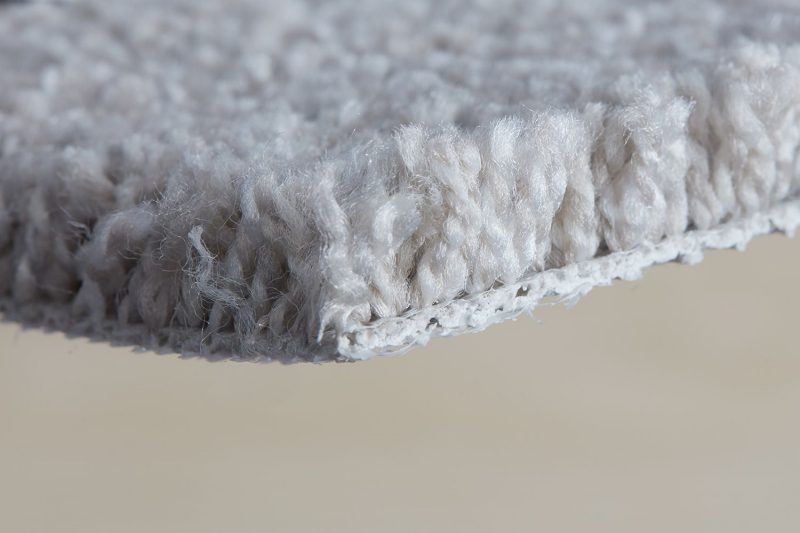
Hardwood
The primary attraction of hardwood floors lies in their authentic wood hues and unique grain designs, which differ based on the wood species. Hardwood flooring makes a striking impression and exudes a sense of strength and stability in both appearance and texture.
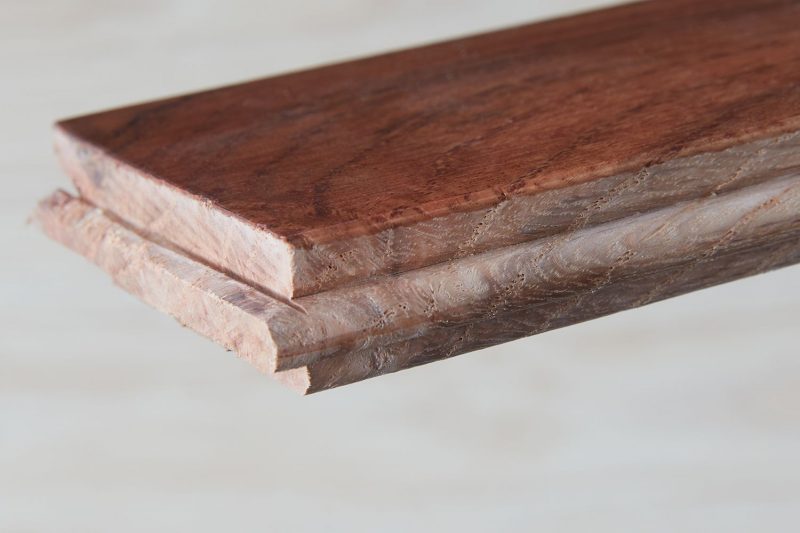
Ideal for Aesthetic Appeal: Hardwood
While individual tastes may vary, many individuals consider hardwood floors to be more visually appealing than carpeting.
Resistance to Water and Heat
Carpet
Most contemporary carpets are made from synthetic fibers, which provide excellent resistance to water damage. Nonetheless, it’s crucial to avoid allowing water to penetrate the backing or the wooden subfloor underneath, as this can lead to mold growth beneath the carpet. Therefore, carpets are generally not advised for humid environments like bathrooms or areas prone to spills, such as kitchens. Additionally, carpets can be easily harmed by the heat from burning cigarettes or hot cookware, and they may release harmful gases in the event of a significant house fire.
Hardwood
Wood flooring is generally not advisable in areas prone to water or humidity, although it can be suitable for kitchens where spills can be quickly cleaned. Installing wood flooring below ground level, especially on concrete slabs, is typically discouraged due to the potential for ground moisture to penetrate. Nevertheless, engineered wood flooring might be resilient enough for such situations. Additionally, hardwood can be damaged by extreme heat, but minor burn marks can often be sanded down and refinished.
Ideal for Water and Heat Resistance: Tie
It is advisable to avoid using carpet and hardwood flooring in areas with high moisture or persistent humidity, like bathrooms or basement slabs. Although carpet fibers themselves resist water damage, the backing material can become a breeding ground for mold and mildew. Hardwood, on the other hand, is susceptible to water damage. Additionally, both flooring types can be harmed by cigarette burns.
Maintenance and Cleaning
Carpet
Regular carpet maintenance includes consistent vacuuming, which, while straightforward, needs to be done often. Nevertheless, certain stains can penetrate deeply and become permanent, and dust and bacteria can become embedded in the fibers, giving the impression that the carpet is never completely clean. Additionally, carpets are often considered unsuitable flooring for individuals with allergies.
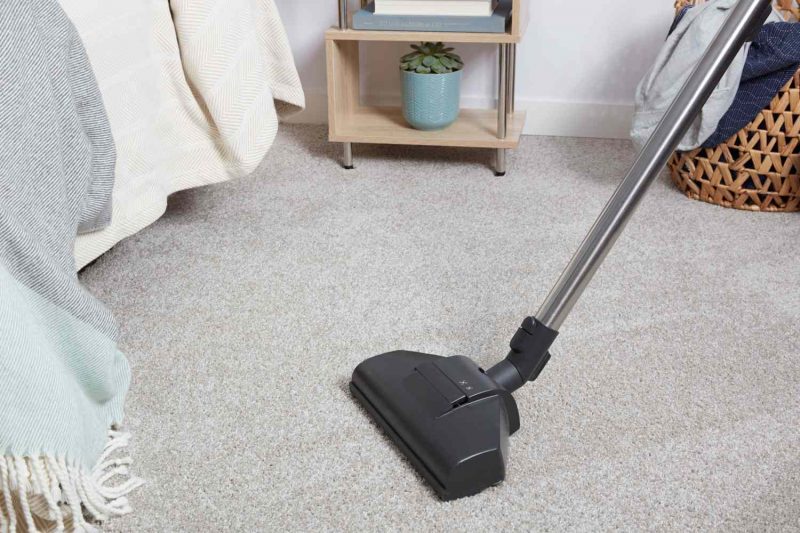
Hardwood
Among the two options, hardwood flooring is significantly simpler to maintain. A quick sweep or vacuum can eliminate surface dirt, and occasional damp mopping with a wood cleaner can tackle deeper grime and most stains.
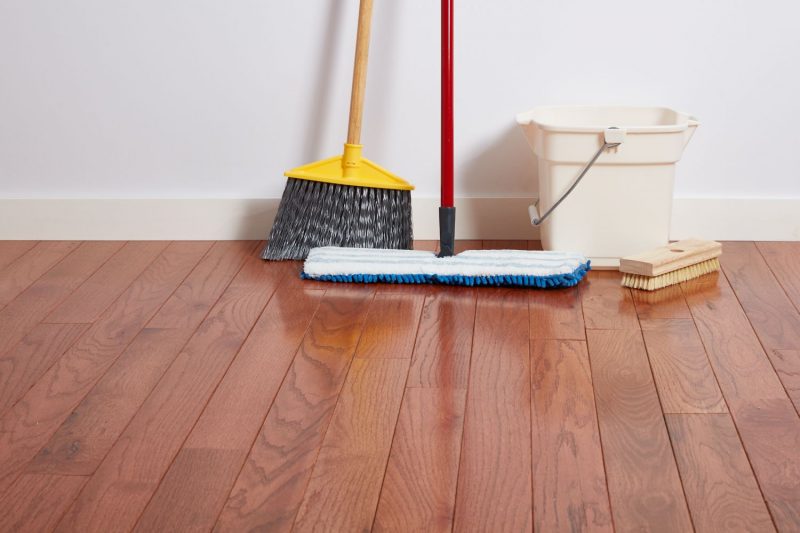
Ideal for Maintenance and Cleaning: Hardwood
Hardwood is often regarded as more low-maintenance because it is less prone to stains and does not harbor dust and allergens as carpets do.
Longevity and Upkeep
Carpet
Regular upkeep should involve regular vacuuming and addressing stains promptly upon discovery. Periodic deep cleaning by a professional service can help prolong the lifespan of your carpet, although it typically won’t last beyond a decade.
Hardwood
With appropriate care, hardwood floors can endure for several decades, and certain premium types can even last for generations. Additionally, solid hardwood can be completely sanded and refinished when it shows significant signs of wear. Typically, floors can be sanded three to four times throughout their lifetime. It’s advisable to refresh the surface varnish every few years, even between sandings. This process generally includes lightly scuffing the finish with a sanding screen and then applying a high-quality polyurethane varnish.
Ideal for Longevity and Upkeep: Hardwood
Hardwood floors offer significant benefits in terms of longevity and ease of upkeep compared to carpets.
Installation
Carpet
When installing carpet, professionals begin by securing an underlayment pad using staples and placing tack strips along the edges of the room. The carpet is then stretched and cut to ensure a perfect fit using specialized equipment. The seams connecting different carpet sections are fused together using heat-activated tape positioned underneath the seams. Given the complexity of this process, it is advisable to hire experts for carpet installation rather than attempting it as a DIY project.
Hardwood
Hardwood flooring is typically installed by placing individual rows of boards sequentially, starting from the longest and most prominent wall. Each subsequent board is fitted by inserting the edge grooves into the tongues of the boards already laid, and then secured to the joists using nails or staples driven at an angle through the tongues. If the boards are unfinished, they undergo sanding, staining, and are then coated with multiple layers of polyurethane varnish. However, most solid hardwood flooring is prefinished at the factory, a practice that also applies to all engineered hardwood flooring options. Generally, the installation of hardwood flooring is carried out by professionals.
Ideal Choice for Installation: Carpet
Installing carpet or hardwood flooring on your own is rare, as both types typically need specialized tools that most individuals do not possess. Nonetheless, the expenses associated with hiring professionals for hardwood flooring installation are significantly greater.
Cost
Carpet
Generally, carpets are much more affordable compared to most hardwood options. While carpets typically require replacement every few years, you can find satisfactory options for under $1 per square foot. Conversely, premium wool carpets can reach prices of up to $20 per square foot. On average, carpets bought from home improvement stores are priced between $3 and $11 per square foot, including installation.
Hardwood
The price of solid hardwood flooring begins at approximately $6 per square foot and can increase from that point. On average, the installation of hardwood flooring ranges from $6 to $12 per square foot.
Most Affordable Option: Carpet
Carpet tends to be much more affordable than hardwood floorshowever, keep in mind that you will probably need to replace it roughly every decade.
Lifespan
Carpet
Typically, carpets need to be replaced within a decade or sooner.
Hardwood
Hardwood floors often have a lifespan of a century, and there are numerous cases where a single floor endures for multiple generations of residents.
Ideal for Longevity: Hardwood
The longevity of hardwood flooring significantly surpasses that of carpet, making it potentially the more economical choice throughout the duration of a home’s life.
Sizes
Carpet
Carpets are generally offered in rolls that are either 12 or 15 feet in length, and they can be cut to the desired size specified by the customer.
Hardwood
Hardwood flooring is generally available in boards that are 48 inches in length, with widths varying between 1 1/2 inches and 4 inches. Solid hardwood boards typically have a thickness of 3/4 inches. In contrast, engineered hardwood offers a wider variety, with planks that can be as wide as 7 inches.
Optimal for Dimensions: Tie
There isn’t a specific size benefit to choosing either carpet or hardwoodit ultimately comes down to personal choice.
Resale Worth
Carpet
Carpeting typically does not significantly enhance property value, as it is often viewed as a low-cost, temporary flooring option. Nevertheless, installing fresh carpeting is likely to be perceived as a positive upgrade compared to worn-out, outdated flooring.
Hardwood
Hardwood flooring is a favored option in home design, often preferred over carpeting. Its reputation stems from being a natural, durable material that exudes a sense of luxury. The choice of wood species and the finishing techniques used can significantly enhance the elegance and status of hardwood as a flooring solution.
Optimal Choice for Resale Value: Hardwood
Real estate agents and potential home buyers often favor hardwood floors instead of carpeting.
Comfort and Audio Quality
Carpet
One of the primary benefits of carpet compared to hardwood flooring is the level of comfort it provides. The softness of carpet is pleasant to walk on, especially when barefoot. This quality is especially beneficial in spaces like bedrooms, children’s rooms, and certain areas of the family and living rooms, where a cozy and relaxing environment is desired. Additionally, carpet tends to retain heat better than hardwood, making it particularly inviting on cold winter mornings. High-quality, dense carpet paired with a quality bonded polyurethane underlay can achieve an R-value of 4 or higher, indicating a significant contribution to the warmth of a room.
Moreover, carpets possess remarkable sound-absorbing qualities. When carpets are installed, they provide a cushioned and insulated layer across the entire floor, effectively preventing sound from easily transmitting through the floors.
Carpet offers a more secure flooring option due to its soft cushioning. Accidents such as trips or falls on hardwood surfaces can lead to injuries and damaged items. This factor is particularly important in households with young children or elderly individuals.
Carpets may not be the best option for individuals with allergies. They tend to harbor dust mites and various allergens. Furthermore, the materials used to create carpets often contain chemicals that can trigger reactions in sensitive individuals. Additionally, carpets are not typically considered an environmentally friendly flooring choice.
Hardwood
One common criticism of hardwood flooring is its noise level. When placed on upper floors, those on lower levels frequently express frustration over being able to hear every step. However, hardwood floors offer a significant advantage in terms of cleanliness. Unlike carpets, which can trap dust and allergens, hardwood can be easily cleaned with a broom or a damp mop, making it a better choice for individuals with allergies.
Hardwood may attract individuals who prioritize eco-friendly building materials. In contrast to most carpets, which primarily consist of processed petroleum products, hardwood is a natural resource derived from trees that can be replanted and replenished. Nevertheless, it’s important to conduct thorough research when purchasing hardwood to confirm that it is sourced sustainably and responsibly.
Ideal for Comfort and Acoustics: Carpet
When it comes to instant comfort, carpet clearly outshines hardwood. Nevertheless, those homeowners who prioritize eco-friendly building materials tend to value the natural characteristics of solid hardwood flooring more highly.
The Ruling
In many respects, hardwood floors outshine carpet, offering greater durability, a more sophisticated look, and enhanced property value. Nevertheless, carpet may be a suitable option if comfort is your main priority or if you’re working with a limited budget. Just keep in mind that you may need to replace the carpet approximately every decade.
Tip
When choosing between carpet and hardwood flooring for a room, keep in mind that the ideal option can differ depending on the specific space.
Leading Brands
Certain businesses focus exclusively on hardwood flooring, while others concentrate on carpets. However, there are several prominent flooring companies that offer a diverse range of both options. Notable companies that provide both carpets and hardwood flooring are:
- Shaw is the largest flooring manufacturer in the United States, featuring subsidiary brands such as Daltile, Pergo, and Marazzi. Their product range includes hardwood floors, carpets, tiles, and laminates.
- Mohawk is a prominent player in the flooring industry, primarily recognized for its carpets, but it also produces a diverse selection of hardwood flooring and various other flooring products.
Carpet:
- Sorona: This well-known brand by DuPont offers some of the most resilient, eco-friendly, and plush carpets on the market.
- Stainmaster: Previously owned by DuPont and currently under the ownership of Lowe’s home improvement chain, this brand is a significant contender in the carpet market.
Timber flooring:
- Bruce, previously under the ownership of Armstrong, is now part of AIP (American Industrial Partners). The company specializes in producing a diverse selection of solid hardwood and engineered hardwood flooring.
- Carlisle specializes in crafting distinctive and premium wide-plank hardwood floors.
